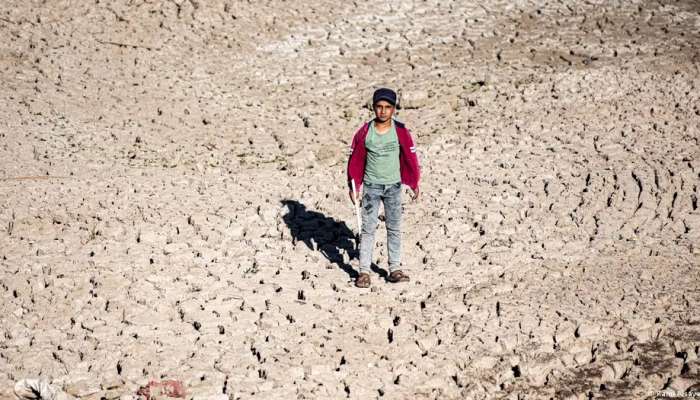
London: Severe drought and water scarcity is impacting communities from Africa to South America and the Middle East, with experts blaming a combination of human-caused global heating and the El Nino weather cycle.
With water stress set to worsen in a warming world, the inevitable strain on irrigation and freshwater supplies extends to hydroelectric power generation, a vital low-carbon energy source that relies on free-flowing rivers.
Hydropower is the world's largest renewable source of electricity — though wind and solar are now growing much faster — and capacity needs to double by 2050 if the world is to limit global temperature increases to 1.5C, says the International Renewable Energy Agency.
But in the first half of 2023, global output suffered a historic 8.5% drop, with China, the world's largest hydroelectricity generator, accounting for three-quarters of the decline after key rivers and reservoirs ran dry.
Hydropower capacity is meanwhile in long-term decline in the Middle East, including along the once fertile Euphrates-Tigris rivers basin that is "one of the fastest-drying regions on earth," according to Benjamin Pohl, head of programme climate diplomacy and security at German think tank Adelphi.
The rivers that run from Turkey through Syria and Iraq once fed the "cradle of human civilization," Pohl told DW.
But ongoing drought — marked by higher evaporation and lower precipitation — and increased competition for scant water resources mean these riparian nations are struggling to nurture both agriculture and hydroelectricity production.
Three hydropower dams built at the head of Euphrates and Tigris rivers in Turkey some 30 years ago have seen a 25% decrease in electricity generation capacity over that time, according to research by Dursun Yildiz, a Turkey-based hydropower expert and president of local NGO, the Hydropolitics Association.
"The decline in electrical energy generation is in great correlation with the droughts in the region”, Yildiz writes. He says the diminishing precipitation and snowfall is linked to climate change, and will ultimately lead to a 30-40% decrease in Euphrates River flows by century's end.
This drying is also impacting countries downstream.
Iraq struggles to power the nation
Benjamin Pohl says damning going in Iran is "reducing flows through to Iraq.”
And in a 2019 study, Sameer Algburi, expert in computer technical engineering at Al-Kitab University in northern Iraq, says river flows have already been slowed by upstream countries like Turkey who are withholding water for their own irrigation and hydropower needs.
Utilising 12 climate models to understand multi-decade changes in stream flow, he predicts that climate change will hasten this reduction and could result in between 5-18% losses in hydroelectric power by 2050.
This might seem modest compared to the 25% decline already observed in Turkey's upper Euphrates basin. Nonetheless, the drop will "likely put considerable strain on Iraq's power system," Algburi told DW.
In a country already struggling to meet its energy needs, hydroelectric power is a crucial renewable energy source that reduces reliance on planet-heating fossil fuels like oil and gas.
Climate change has made drought in the Euphrates-Tigris River Basin likely once in 10 years, as opposed to every 250 years before average temperatures began to rise, according to a 2023 report by World Weather Attribution (WWA) — a London-based thinktank that clarifies the connection between extreme weather and climate change.
With Iraq's relatively young population set to endure increasing extreme heat and drought, reliable hydroelectricity remains a vital means of tackling both climate change and energy security in a post-fossil fuel world, Algburi said.
To mitigate climate change impacts on hydropower in Iraq, he suggests building more efficient plants, and employing better resource management through water recycling, or the development of micro-dams for storage of excess water during rainfall.
"Water recycling and micro-dams are valuable tools for addressing localised water scarcity and improving resilience to drought," he said, adding that "climate-resilient agricultural practices and regional cooperation" will also be key to mazimising diminishing water resources.
Water scarcity demands regional cooperation
WWA calculated that a 2020-23 drought in the Euphrates-Tigris River Basin was "the second worst in the observed record” and was "driven by rising temperatures.”
This is having a devastating impact on a large part of the population who depended on rain-fed agriculture such as wheat farming and livestock.
"Some places in Syria and Iraq are totally dry," said Noama Shareef, a MENA region water management expert based in Germany. She adds that worsening drought has led to mass displacement of local communities.
"Future wars will be over water," said Shareef of tensions over human activities such as upstream water withdrawals and dam constructions — especially in Turkey. "This is also a political issue," she added.
Benjamin Pohl of Adelphi believes that cooperation and improved water management will ultimately be in the "shared interests” of all the riparian countries along the Euphrates and Tigris rivers — including the need for clean hydropower to mitigate the climate crisis.
As war-ravaged countries like Iraq and Syria struggle to find the investment for adequate climate adaptation, a collective agreement updating outmoded treaties over water allocation in the Ephrates-Tigris basin, is fundamental to "maximimising resource use across the region," said Pohl. Such a binding treaty is not currently being negotiated, however.
"We need to take a seat at the table," said Shareef, a Syrian citizen, of the need for greater regional collaboration over swindling water resources.